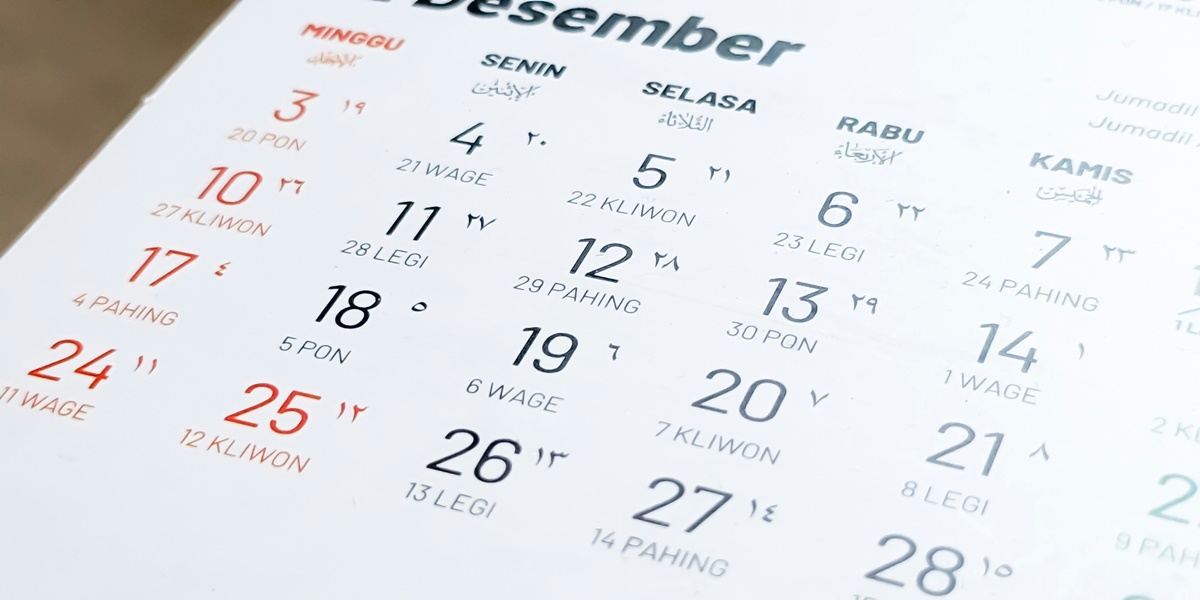How to Determine a Good Day to Dig a Well According to Javanese Primbon, Know the Calculation Method
So, what is the explanation of a good day to dig a well according to Javanese primbon? To find out, just take a look at the following discussion.

Kapanlagi.com - Javanese Primbon has become a part of the culture and traditions of traditional society. There are many teachings of Javanese primbon that have been held from the past to the present. One example of a teaching that is still upheld is the teaching about the existence of good days in seeking fortune according to Javanese primbon. Even today, many still believe and affirm this teaching.
For those who believe, a good day to seek fortune according to Javanese primbon is a day that is truly full of blessings. This day is believed to bring abundant fortune. Interestingly, in seeking fortune, according to Javanese primbon, each person has their own good day.
So, how do you determine a good day to seek fortune according to Javanese primbon? To find out, let's directly look at the following discussion.

Understanding the Neptu Concept to Find a Good Day (credit: unsplash)
In determining a good day for seeking fortune according to Javanese primbon, it can be done through a calculation method involving a special formula that includes the neptu numbers. Therefore, before knowing how to determine a good day for seeking fortune, it is important to understand what neptu is in Javanese primbon.
Generally, neptu in Javanese tradition refers to a specific value assigned to each day of birth (Monday, Tuesday, Wednesday, Thursday, Friday, Saturday, and Sunday) and the values of the Javanese market days (Legi, Pahing, Pon, Wage, and Kliwon). Neptu is the sum of the value of the birth day and the Javanese market day that coincides with a specific time or date.
To clarify, see the explanation and calculation examples below
Value of Birth Days
- Sunday has a value of 5
- Monday has a value of 4
- Tuesday has a value of 3
- Wednesday has a value of 7
- Thursday has a value of 8
- Friday has a value of 6
- Saturday has a value of 9
Value of Javanese Market Days
- The Javanese market day Legi has a value of 5
- The Javanese market day Pahing has a value of 9
- The Javanese market day Pon has a value of 7
- The Javanese market day Wage has a value of 4
- The Javanese market day Kliwon has a value of 8
For example:
On Tuesday Pon, the neptu value is 10 (result of 3 + 7).

How to Determine a Good Day for Seeking Fortune (credit: unsplash)
To determine a good day, the method is quite simple. Traditional Javanese society uses a counting method involving the neptu number and the neptu of the chosen day or the day to be used for seeking fortune.
The steps are very simple, which is just to add the birth weton with the neptu of the fortune-seeking day. Once done, the result of the addition of the two neptus is then divided by 7.
From this calculation, a remainder number will be obtained. This remainder number is believed to have a certain meaning in the context of luck and fortune.

Explanation of the Meaning of the Remainder Number in the Calculation of a Good Day for Seeking Fortune (credit: unsplash)
Here is an explanation of the meaning of the remainder of a division:
- If the result is a remainder of 1, it is believed that this day is truly a good day for seeking fortune according to Javanese primbon. Seeking fortune or working on this day is believed to bring in a lot of fortune.
- Meanwhile, if the result is a remainder of 2, it is believed that this day is also quite good for seeking fortune. Although it may not always go smoothly, trying to seek fortune on this day is believed to still yield results, or in other words, will not be in vain.
- If the remainder is 3, it is believed that this day will be easy for obtaining fortune. People who work on this day will always find ease.
- If the remainder is 4, then this day is not good for seeking fortune. The work or activities done on this day may only be a mere escape, resulting in suboptimal outcomes.
- If the remainder is 5, it is believed that this day could be a good day for seeking fortune for farmers or land cultivators.
- Meanwhile, if the calculation results in a remainder of 6, it means this day can be considered a bad day. This day may bring various trials.
- A remainder of 7 is interpreted as a deficiency, which may cause the work done on this day to lead to a relocation.
That is among the reviews on how to determine a good day according to Javanese primbon. Hopefully, it is beneficial and can satisfy your curiosity all this time. For the rest, whether to believe or not is left back to the hands of the reader.
(kpl/psp)
Cobain For You Page (FYP) Yang kamu suka ada di sini,
lihat isinya
So, what is the explanation of a good day to dig a well according to Javanese primbon? To find out, just take a look at the following discussion.
For those of you who are gamers and also love Chinese dramas about e-sports available on Netflix, this is a must-add to your watch list.
Kim Bum is an INTJ, KLovers, and he certainly has an interesting personality for you to explore. Let’s delve into how the characteristics of an INTJ are reflected in Kim Bum's personality, a talented Korean actor with a Casanova aura that keeps fans on their toes. Let’s check it out!
In society, dreams about teeth, especially loose or fallen teeth, are often associated with various myths and traditional beliefs. Therefore, many people are curious about the meaning of dreaming about loose teeth.
Let's take a look at the synopsis of the film HELL OR HIGH WATER released in 2016, complete with a cast list and character explanations. Come on, let's check it out, KLovers!
Anime with dark storylines offers an unforgettable experience. Get ready to be taken into a world full of intrigue, moral dilemmas, and realities that are not always beautiful through the following recommendations for anime with dark storylines.
Let’s explore how the typical characteristics of blood type A belonging to Gong Yoo might be reflected in this talented Korean actor. Come on, let’s check it out, KLovers!
Let’s uncover the hidden side of the queen of dramas, revealing the true character that shapes Park Shin Hye's uniqueness seen from her MBTI type, which is INFJ. Curious? Just check it out, KLovers.
The word ai in Japanese has become a universal symbol of deep love. Let's take a look at the explanation of ai in Japanese, complete with other expressions of love that you can know and understand. Check it out, Lovers.
Korean drama MISS NIGHT AND DAY presents the story of a woman who experiences an extraordinary age transformation. For those who are curious, here is the synopsis of Korean drama MISS NIGHT AND DAY in 2024, promising laughter, sadness, and reflection. Let's check it out, KLovers!
Thai dramas often present unique and entertaining stories. There are also sad stories that are emotionally draining. Thai dramas with iconic scenes also add their own appeal to the audience.
Anime about cooking competitions has indeed become one of the increasingly popular genres in the anime world. So, what are the anime about cooking competitions? Let's explore some of the best anime that revolve around this cooking competition theme.